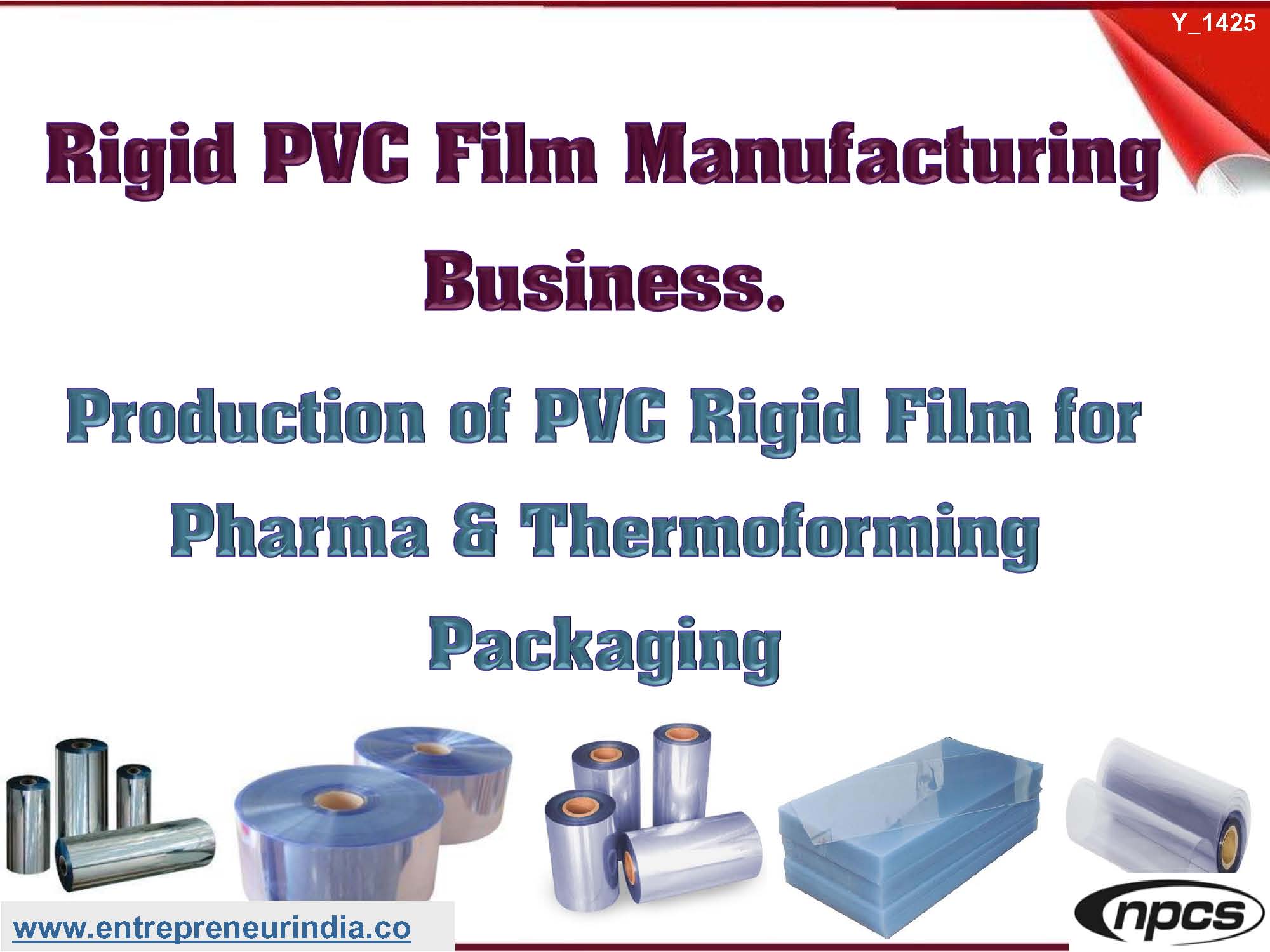
The Rigid PVC Film Manufacturing Business has emerged as a cornerstone in the global plastics and packaging sector due to its extensive applications, durability, and cost-effectiveness. With growing demand across pharmaceuticals, food packaging, printing, stationery, and construction, entrepreneurs are seizing the opportunity to invest in this high-potential manufacturing segment. The consistent need for rigid films that ensure protection, transparency, and strength makes this business not just relevant but increasingly profitable.
Why the Rigid PVC Film Market is Growing Rapidly
Rigid PVC films offer an unbeatable combination of mechanical strength, chemical resistance, and cost-efficiency. They are ideal for thermoforming applications and widely used in blister packaging, credit cards, ID cards, graphic arts, labels, and other industrial products. With increasing demand for safe packaging in pharmaceuticals and food-grade materials, the Rigid PVC Film Manufacturing Business is poised for rapid expansion.
As the global economy leans towards industrial-scale production and sustainable materials, rigid PVC films provide a balance of recyclability and reliability. The ability to customize these films with different thicknesses, colors, and finishes adds to their industrial attractiveness.
Setting Up a Rigid PVC Film Manufacturing Unit
To successfully establish a Rigid PVC Film Manufacturing Business, one needs to carefully plan around equipment, technology, compliance, and raw materials. The production involves:
-
Mixing and extrusion of PVC compounds
-
Calendering or casting for flat film formation
-
Surface finishing, trimming, and winding
-
Packaging and dispatch
The main raw materials include PVC resin, plasticizers (for flexible grades), stabilizers, lubricants, and pigments. Choosing high-grade inputs is vital for producing films that meet ISO and FDA standards, especially in food or pharma applications.
Initial setup costs range between $200,000 to $500,000, depending on capacity and automation levels. This includes calendering machines, cooling systems, rolling stations, extrusion lines, and quality control labs. Additionally, compliance with local environmental regulations and certifications like ISO 9001 or GMP may be necessary.
Applications Driving the Rigid PVC Film Manufacturing Business
The diversity of applications is what makes the Rigid PVC Film Manufacturing Business so attractive. Major uses include:
-
Pharmaceutical packaging: Blister packs, strip packs
-
Food packaging: Vacuum-formed trays, clamshell containers
-
Graphic arts: Overlay films, laminates, printing bases
-
Construction: False ceilings, wall panels
-
Consumer goods: Cards, stationery, and covers
These films are available in matte, gloss, transparent, and colored varieties, making them highly adaptable across industries.
Profit Margins and Revenue Potential
A typical Rigid PVC Film Manufacturing Business enjoys gross margins between 20% to 35%, with net profitability stabilizing around 12% to 18% after operational costs. A mid-size plant with a monthly output of 100 tons can generate monthly revenue upwards of $200,000 depending on product grade and customer base.
Profitability is highly influenced by:
-
Stable supply of raw materials
-
Power and energy efficiency
-
Minimal wastage through recycling
-
Effective sales and distribution networks
Export opportunities to the Middle East, Africa, and Southeast Asia further enhance revenue potential for manufacturers who maintain international quality standards.
Marketing and Distribution Strategies
To thrive in the Rigid PVC Film Manufacturing Business, targeted marketing and supply chain management are crucial. Partnering with pharma companies, packaging units, and industrial distributors can ensure stable demand. Exhibiting at trade fairs, B2B platforms, and digital marketing are equally essential.
Building strong relationships with packaging designers and converters helps create recurring orders. Having in-house R&D and product customization capability also gives your business a competitive edge.
Sustainability in Rigid PVC Film Manufacturing
Environmental sustainability is becoming a significant factor in the Rigid PVC Film Manufacturing Business. Many manufacturers are investing in:
-
Recyclable PVC grades
-
Non-toxic stabilizers and plasticizers
-
Energy-efficient production systems
PVC is inherently recyclable, and reusing production scraps in-house is a common cost-saving and eco-friendly practice. Adopting sustainable operations is not just good for the planet, but also attracts clients with green procurement policies.
Regulatory Compliance and Certifications
Ensuring regulatory compliance is essential for running a Rigid PVC Film Manufacturing Business, especially when serving pharmaceutical or food industries. Depending on your target market, your factory may require:
-
ISO 9001 Quality Management Certification
-
ISO 22000 or HACCP for food packaging
-
FDA or EU regulations compliance
-
Local Pollution Control Board (PCB) clearance
Adhering to these ensures credibility, increases trust with buyers, and helps in scaling exports.
Challenges in the Industry and How to Overcome Them
While the Rigid PVC Film Manufacturing Business has immense potential, it is not without challenges. Common issues include:
-
Volatility in raw material prices
-
Stringent environmental regulations
-
Need for skilled technical manpower
-
High competition from Chinese and local players
Overcoming these requires strategic sourcing, continuous staff training, automation for consistency, and a focus on product innovation. Incorporating ERP systems for managing production and logistics can also help maintain operational efficiency.
Future Prospects of Rigid PVC Film Industry
The future of the Rigid PVC Film Manufacturing Business looks promising with rising industrial applications and demand for hygienic packaging. Innovations such as antimicrobial films, biodegradable blends, and smart labeling compatibility are reshaping the landscape.
The growing trend of e-commerce and packaged foods is also driving up the consumption of rigid PVC-based packaging. By keeping pace with market trends and maintaining operational excellence, businesses can scale rapidly and establish global footprints.
Conclusion
The Rigid PVC Film Manufacturing Business is a lucrative and future-ready industrial venture with wide-ranging applications and consistent demand. Entrepreneurs who invest wisely in technology, product quality, compliance, and marketing are well-positioned to dominate this dynamic segment. As industries worldwide continue to evolve, so will the need for reliable, versatile packaging solutions — and rigid PVC films are at the heart of that evolution.
Niir Project Consultancy Services
An ISO 9001:2015 Company
106-E, Kamla Nagar, Opp. Spark Mall,
New Delhi-110007, India.
Email: npcs.ei@gmail.com , info@entrepreneurindia.co
Tel: +91-11-23843955, 23845654, 23845886, 8800733955
Mobile: +91-9811043595
Website: www.entrepreneurindia.co , www.niir.org





